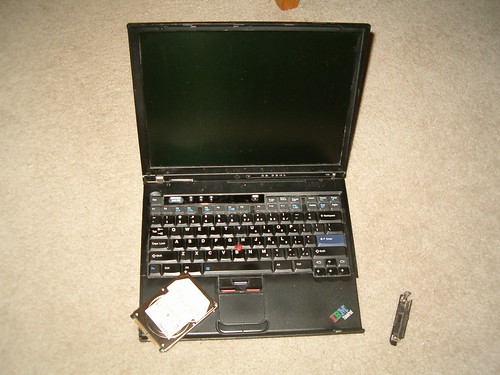They'd be perfect if we didn't need to run programs on them

The finish line is in sight for the two-week long odyssey of the computer rebuild hell which has made my outlook on life even gloomier than usual these days. Just today I read a column in the local paper about the importance of file backups, but I'm here to tell you that admirable as this endeavor is, it is simply not enough if you value your precious binary data.
The problem is that simply copying the data over to a new machine is not enough, even if you don't happen to need to go between different versions of the operating system. Even though I had the contact management and the bookkeeping data files from just before the old laptop died, they were basically useless without the programs themselves in running order, and it didn't take much difference between the layouts of the old and new machines to insure that the program files and configuration would not play nicely with my new setup. No, it was a matter of going back to original distribution CDs and reinstalling everything from the bottom up.
The trouble was that over time I seem to have acquired a hundred or more of the installation CDs, packed away in boxes and folders and sleeves, and I spent a long, long time looking for what I needed. Luckily I did find a Windows XP Pro installation disk I'd bought years ago when I thought I was going to upgrade my wife's Presario, a failed effort at the time, so with some effort I was able to set up a dual-boot arrangement on the laptop, making it a little less likely that I'd destroy everything I had. But the CRM and ancillary software installation disks were nowhere to be found, and I began to suspect that at the time I started up my business, the laptop was delivered to me without the installation media. If I were an independent operator I would have had a hard time getting these, but as a franchise member in good standing with my Home Office I was able to contact the IS people there who set up the machine and get some disks of the appropriate vintage sent out to me by overnight mail.
This is the basis of my current idea: I would like there to be a service which would take my installation disks and store them for me in some organized fashion. Including the vital license/serial number information and the documentation for installation. Maybe they'd just provide mailers so I could dump in the whole box the software came in, and periodically email me a list of the software they have on hand. I guess for software which I received electronically (as a download), I could imagine an upload server to send the package to. Then when the hardware fails, I could contact them with a list of what I needed and they would send back just what I needed (maybe from a common stock of media from their warehouse, along with an electronic record of the license key). Maybe it would be on a subscription basis, so that as long as I had a current membership they would not need to charge me at crunch time, or maybe they could have some kind of partnership program with software vendors where they could provide programs (and upgrades?) to their members at a discount. Or they could have an arrangement whereby one could obtain software which had not been previously vaulted, assuming I knew the name of the program and the version, with a new key.
If you are like most people and the data you want to keep is in the form of text files, pictures, and music files (DRM-free, that is), this won't be quite so critical to you, since pretty much any computer you buy off the shelf will be able to give you access to these. But you might well have some accounting software or video editing applications which might not come standard on a basic computer which you still might need to maintain the ability to install when the PC dies.
It's times like these that remind me why I do not ever want to go back into the business of supporting computers myself. I actually contacted a company here to do the hard work, but it turned out that they were already working at capacity and declined taking my troubles on at $125/hour.

No comments:
Post a Comment